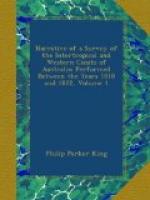The presence of a fleet of Malay proas in the roads has been before mentioned; it had just returned from an unsuccessful voyage on the south coast of Timor in search of trepang. Dramah, the principal rajah of this fleet, gave me the following information respecting the coast of New Holland, which he had frequently visited in the command of a fleet that annually frequents its shores.
The coast is called by them Marega, and has been known to them for many years. A fleet to the number of 200* proas annually leaves Macassar for this fishery; it sails in January during the westerly monsoon, and coasts from island to island, until it reaches the North-East end of Timor, when it steers South-East and South-South-East, which courses carry them to the coast of New Holland; the body of the fleet then steers eastward, leaving here and there a division of fifteen or sixteen proas, under the command of an inferior rajah, who leads the fleet, and is always implicitly obeyed. His proa is the only vessel that is provided with a compass; it also has one or two swivels or small guns, and is perhaps armed with muskets. Their provisions chiefly consist of rice and coconuts; and their water, which during the westerly monsoon is easily replenished on all parts of the coast, is carried in joints of bamboo.
(Footnote. This number is perhaps very much exaggerated.)
The method of curing the trepang is thus described by Captain Flinders: “They get the trepang by diving, in from three to eight fathoms water; and where it is abundant, a man will bring up eight or ten at a time. The mode of preserving it is this: the animal is split down on one side, boiled, and pressed with a weight of stones; then stretched open by slips of bamboo, dried in the sun, and afterwards in smoke, when it is fit to be put away in bags, but requires frequent exposure to the sun. A thousand trepang make a picol, of about 125 Dutch pounds; and 100 picols are a cargo for a proa. It is carried to Timor and sold to the Chinese, who meet them there; and when all the proas are assembled, the fleet returns to Macassar. By Timor, seemed to be meant Timor-laoet; for when I inquired concerning the English, Dutch, and Portuguese there, Pobasso (the rajah in command) knew nothing of them: he had heard of Coepang, a Dutch settlement, but said it was upon another island.
“There are two kinds of trepang. The black, called baatoo, is sold to the Chinese for forty dollars the picol; the white, or gray, called koro, is worth no more than twenty. The baatoo seems to be what we found upon the coral reefs near the Northumberland Islands; and were a colony established in Broad Sound or Shoalwater Bay it might perhaps derive considerable advantage from the trepang. In the Gulf of Carpentaria we did not observe any other than the gray slug."*
(Footnote. Flinders volume 2 page 231.)




